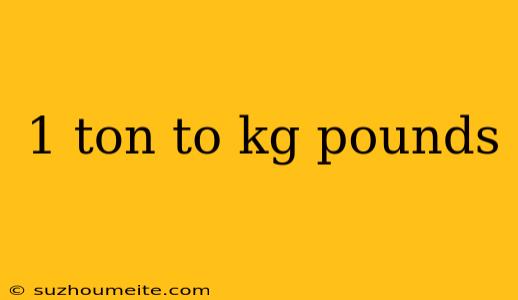1 Ton to kg and Pounds: Understanding Weight Conversions
When dealing with weights, it's essential to understand the different units of measurement and how to convert between them. One ton is a commonly used unit of weight, but what does it equate to in kilograms and pounds? In this article, we'll explore the conversions and provide a clear understanding of these weight units.
What is a Ton?
A ton is a unit of weight or mass, often used to measure large quantities of goods, such as cargo or construction materials. It's commonly used in international trade, commerce, and engineering applications. There are different types of tons, including:
- Metric ton: 1,000 kilograms (or 1 megagram)
- Long ton: 2,240 pounds (or 1,016 kilograms)
- Short ton: 2,000 pounds (or 907 kilograms)
For the purpose of this article, we'll focus on the metric ton, which is the most widely used and accepted unit of measurement.
Converting 1 Ton to Kilograms
As mentioned earlier, 1 metric ton is equal to 1,000 kilograms. This means that if you need to convert 1 ton to kilograms, the conversion is straightforward:
1 ton = 1,000 kg
Converting 1 Ton to Pounds
To convert 1 ton to pounds, we need to consider the conversion factor. Since 1 kilogram is equal to 2.20462 pounds, we can use the following conversion factor:
1 ton = 1,000 kg * 2.20462 pounds/kg = 2,204.62 pounds
So, 1 ton is equivalent to approximately 2,204.62 pounds.
Why Understanding Weight Conversions Matters
Accurate weight conversions are crucial in various industries, such as:
- Logistics and shipping: To calculate transportation costs and optimize cargo capacity.
- Construction and engineering: To determine the structural integrity of buildings and infrastructure.
- Commerce and trade: To accurately price and trade goods internationally.
In conclusion, understanding the conversions between tons, kilograms, and pounds is essential for precise calculations and effective communication in various industries. By grasping these conversions, you'll be better equipped to navigate the complexities of weight measurements and make informed decisions in your field.
